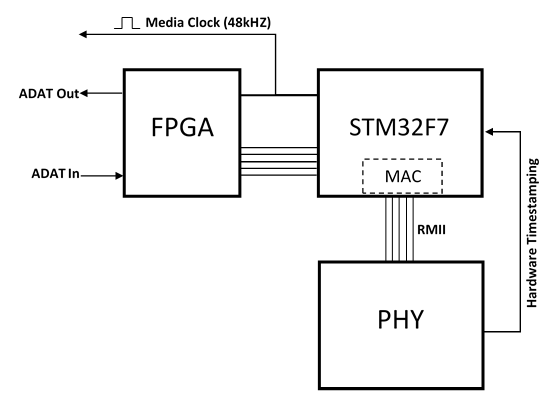Glensound AoIP44 / Dante Ultimo X4 Chipset
Nicholas Humfrey
- When AES67 mode is enabled, it appears that the sample rate is fixed to 48khz and the encoding fixed at PCM24
- It is not possible to enable AES67 mode in Dante Virtual Soundcard
- I contacted Audinate and they have no plans to add support for it
- SAP Announcements are sent every 30 seconds (too long to wait for in a CLI tool?)
- I have not yet seen an RTCP packets being sent (should be on port 5005)
- AOIP44 appears to be using both PTPv1 and PTPv2
- PTPv1 might be for Dante Protocol?
- PTPv2 might be for AES67?
- MacBook (Dante Virtual Soundcard) only appears to be using PTPv1
- The AOIP44 is making Multicast DNS queries
- It appears to be used for service discovery by Dante Controller and finding devices on the network
- It doesn't appear to be being used for AES67 audio
- It uses the service names
netaudio,netaudio-cmc,netaudio-arc, dante-ddm-c They don't appear to be registered with IANA
- Disappointingly it only appears to be able to transmit two AES67 multicast flows at a time. It is therefore not possible to create 4x mono AES67 flows.
- I haven't yet worked out how to get it to receive an AES67 flow - it probably needs a SAP announcement that it likes the look of.
BOJIT
Nicholas Humfrey
Hi James,
Those STM32 boards look interesting - would be a fun project! Are you aware of any Open Source PTP implementations that would run on such a small amount of RAM, or are you planning on implementing PTPv2 yourself? I wonder what sort of latency/jitter can be achieved without hardware time-stamping? I imagine that the Raspberry Pi using USB for Ethernet isn't going to help latency either.
If doing analogue <-> AoIP, the other hardware requirement is being able to accurately adjust the clock of the audio ADC/DAC converters.
I tried the Ravenna Virtual Sound Card on my Mac, but failed to get it to work - because of annoying security / permission problems. The proprietary license for the Linux build isn't going to do anything to help adoption :-(
I do wonder if Audinate added AES67 support, just so they can tick a box - rather than actually wanting to participate in an AES67 ecosystem.
nick.
--
You received this message because you are subscribed to the Google Groups "Audio over IP" group.
To unsubscribe from this group and stop receiving emails from it, send an email to audio-over-i...@googlegroups.com.
To view this discussion on the web, visit https://groups.google.com/d/msgid/audio-over-ip/581225fb-05db-4925-bc0f-49fd69a729df%40googlegroups.com.
BOJIT

To unsubscribe from this group and stop receiving emails from it, send an email to audio-...@googlegroups.com.
Nicholas Humfrey
Hi!
That sounds like a very impressive project!
If you get the PTP Grand Master working, I would love to try and build a copy of it.
I was trying to install ptpd 2.3.1 on my Mac today and saw the following notice:
"As of 2.3.1, PTPd still does not support hardware timestamping."
Do let us know how you get on...
nick.
To unsubscribe from this group and stop receiving emails from it, send an email to audio-over-i...@googlegroups.com.
To view this discussion on the web, visit https://groups.google.com/d/msgid/audio-over-ip/5352ee48-7369-4ae5-a510-2bfdbcc3e533%40googlegroups.com.
